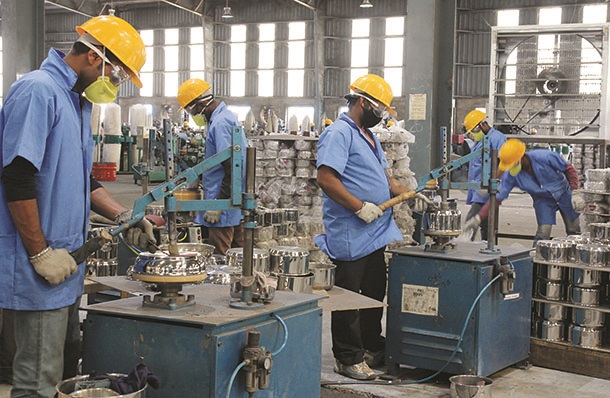
P Rajeeve
KERALA has long been recognised for its advancements in human development indices and consistently ranks first in Sustainable Development Goals in India. The “Kerala Model” of development, which emphasizes universal access to education and healthcare, is acclaimed globally. However, Comrade EMS Namboodiripad once expressed concerns about the sustainability of this model if the state does not advance in the productive sectors, particularly in agriculture and industry. In response, the last two LDF governments have focused on two key areas: strengthening the social service sector to ensure ‘quality’ education, healthcare, and welfare, while simultaneously developing infrastructure and boosting productivity in agriculture and industry.
The government’s new industrial policy, with the motto “Nature, People, Industry,” acknowledges the unique challenges of industrial development in Kerala. Ecological sensitivity and high cost of the available limited land is a hurdle for industrialisation of the state. Consequently, the focus has shifted towards supporting micro, small, and medium enterprises (MSMEs) along with knowledge-based industries. In the 2022-23 fiscal year, the government initiated the “Year of Enterprises” campaign, aiming to establish 100,000 new enterprises in a year. This effort involved a coordinated approach, with chief minister-led meetings involving ministers from various portfolios, and a high-level committee headed by the chief secretary to oversee the campaign. The industries ministry also consulted with small industries organisations and trade unions for proper implementation.
To support the campaign, the industries department recruited management and engineering graduates as interns to help facilitate industrial development at the local level. An interest subvention scheme was introduced to offer loans to small investors at a reduced 4 per cent interest rate, and loan fairs were organised to assist micro and small entrepreneurs. To enhance the use of technology in local industries, the ministry held meetings with research organisations to create a mechanism for technology transfer. Based on a thorough survey and consultations, the ministry identified priority products for local manufacturing.
In a significant move, the government simplified the licensing process for MSMEs, allowing them to operate without a licence for the first three and a half years, after which they must acquire all required licences. An online registration with a single window clearance mechanism is the only requirement. The campaign achieved its target within six months and continued into subsequent financial years. To date, 321,581 MSMEs have been established, with a total investment of Rs 20,625 crore and the creation of 682,241 jobs. Notably, personal savings, gold, and NRI remittances have been transformed into industrial capital, boosting the local economy.
A key feature of this campaign is its inclusivity: among the new entrepreneurs, 102,942 are women, and 37 are transgender individuals. In terms of social distribution, 11,794 are from Scheduled Castes, 945 from Scheduled Tribes, and 23,645 from minority communities. Among these enterprises, 45,233 are in manufacturing, while 133,576 operate in the service sector. All campaign details are available in the public domain.
To support MSMEs further, the Institute of Chartered Accountants of India (ICAI) set up district-level help desks offering free services for preparing GST returns and financial statements. The government also established district-level MSME clinics to provide free professional support in technical, management, and marketing sectors. Additionally, a new insurance scheme offers MSMEs a 50 per cent subsidy on insurance premiums. To secure market access, the ministry signed an MoU with the public distribution ministry to allocate free space for local industries in K Stores (an extension of ration shops). Within six months, these K Stores achieved sales of Rs 10 crore. The government also developed an online platform to facilitate the sale of products from PSUs, the traditional sector, and MSMEs. A “Kerala Brand” label was created to promote products meeting high standards of quality, ethics, environmental responsibility, and inclusive workforce participation. The executives physically visited all new units and prepared a jio tagging mechanism. The struggling investors had been assisted by the department for survival and advancement. By this process the state could control the mortality rate of the new MSMEs also.
The government has launched “Mission Thousand,” a scheme to develop 1,000 industries, each with an average turnover of Rs 100 crore, by offering them hands-on support and financial backing. Another innovative programme, Campus Industrial Parks, provides land for small industries in the campus itself and gives opportunities for students to work on an hourly wage, fostering a direct connection between academia and industry. These initiatives have revitalised the MSME sector in Kerala, with the “Year of Enterprises” campaign being recognised as a best practice by the union government.
Recently, the government decided to issue industrial licenses to home-based small businesses, helping educated homemakers earn an income. The Kudumbashree initiative, originally focused on self-help groups, is now pivoting towards nano and micro-industrial activities. Collectively, these efforts are transforming Kerala into a thriving landscape of MSMEs, fostering economic growth and resilience across the state.


